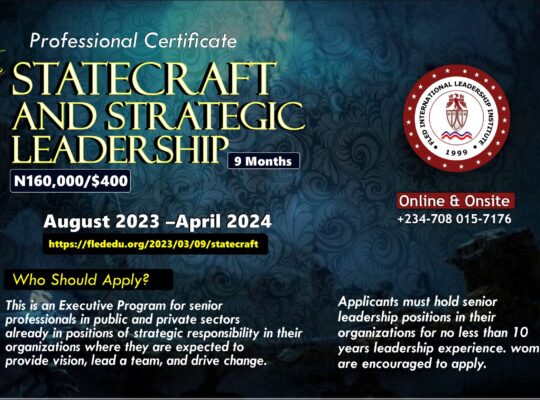The three sides of Leadership
By Joseph C. Ibekwe
Many define leadership in different ways. In fact, there is no generally accepted definition for the word or the concept “Leadership”. Some define leadership from the character perspective, others define it from the action perspective, others define leadership from the impact and consequences perspective. Each of these perception-based definitions are correct, but none of them captures the true essence of leadership.
Leadership is holistically wrapped in what I refer to as the trinity of leadership. At FLED Institute, we teach that “leadership is a spirit, leadership has a soul and leadership has a body”. This is a descriptive definition of leadership that we espouse. Spirit, soul and body are what we call the trinity of leadership.
The spirit of leadership is captured in three key things: vision, values and passion.
Vision is that ability or capacity to see a possible better future than currently exists.
Values is what the visioner or the vision-bearer considers important and *how* that vision has to be pursued. In other words, it is the values the visioner bearer holds dear that determines how he/she goes about in the pursuit and actualisation of the vision.
For instance, everyone wants to be rich. There is nothing wrong with that vision. But what makes the difference is how each individual that wants to be rich goes about in pursuit of riches. Some might go the way of honest labour, some might go the way of trick, deceit, stealing, committing fraud or ritual sacrifices. When values are not factored in in the pursuit of vision, then the statement that says “The end justifies the means”, because accepted. This case is what obtains in the political terrain. Many of those that seek public office don’t have values that demands them to pursue their vision by honest engagement with the people and the system.
Being rich or winning election is important. But how you became rich or how you won the election is much more important, because that is the prove of the kind of values you hold. Any fool can be rich. Any scoundrel can win elections, but do you want to associate with a rich fool or with a values-bereft person who wins election to lead you?
Passion is that inner drive, in the bowels of a vision-bearer, that pushes, compels and moves him/her to go the extra mile, by the right values, in pursuit of the vision. Without Passion, no vision can be realized.
Vision, values and passion constitute the intangible or the core dimensions of leadership. The spirit is the centre-point. This is what determines *what* a leader does and how he/she lives and functions.
The soul of leadership is encapsulated in three key concepts, which are often loosely touted. The three key concepts form what I refer to as BRA. When I teach this to my students and mention the word, ‘BRA’ or say that every leader must have a BRA, everyone’s eyes pop up, like, “What are you saying?”
Well, BRA is an acronym for “Brave, Responsible and Accountable”.
Every visionary, values-driven, passionate leader must be brave, courageous and assertive. Why is this important? Simple! In the pursuit of vision, the vision-bearer is bound to encounter obstacles, challenges and discouraging situations. The leader should rise from the inside to confront these challenges. If the vision is to secure a better possible situation than presently exists, then the visioner must be prepared to face daunting challenges. You can’t climb without encountering gravity. Boldness is key.
Responsibility is about knowing what do, how to do it, and doing it at the right time, in the most appropriate way and manner. Responsibility is also about accepting blames for the consequences of the outcome of what you did, what you did not do, and how you did what you did. Responsibility is also about knowing expectations on you by reason of the leadership position you occupy and taking necessary, values-based steps to meet those expectations timeously. Responsible leaders don’t give excuses for failure and they don’t shift blames to anyone or to circumstances. They simply accept Responsibility. Once a leader excuses himself or absolves himself of blames, he accuses himself of irresponsibility. There are many irresponsible leaders in Africa and in your communities. You know them because they always give you reasons why they can’t do what they expected to do. Excuses do not absolve a leader of responsibility. Please take note of this.
Accountability is about giving feedback, it’s about being answerable, it’s about being transparent. For a leader to be honoured as being responsible, he/she must also be accountable. He must voluntarily make himself available to answer to questions about what he does and why does them. Answerability is a key element of effective leadership. Ineffective leaders don’t like to give account. In fact, they consider it infradig to be asked to give account of anything. To be accountable means you should be ready to answer questions about your private life and your public life, particularly if you seek public office.
When we say every public space leader must be BRA-compliant, what we mean is that every leader must be Brave, Responsible and Accountable. This is the soul of leadership.
Being visionary, values-driven, passionate, brave responsible, accountable would mean nothing except there is evidence that the long and winding engagement of your life’s pursuit translates a better quality of life for others and for yourself.
The evidence of visionary leadership is a higher quality or higher standard of living for the people for which a leader comes up. In other words, the Body of leadership is PEOPLE.
The overall enhanced wellbeing of people is the sole essence of public leadership. Anything less than this is empty and hugwash.
Leadership is about people: about people’s welfare, about better opportunities for people to enjoy better life. It’s about people’s security, people’s liberty to express themselves and explore their potentials.The most credible evidence of the effectiveness of public leadership is the quality of life of the people before and during the reign of such leadership.
Wherever you live and in whichever culture you operate, these three aspects of leadership are relevant. They should guide you in deciding who you elect to lead in your local association, your community, your municipality, your state or country. Don’t be deceived by those that say, “I have a vision to do this or do that” and capture it as Manifesto. Consider what values upon which they have conducted their lives in the past. If you approve of their values, then vote them in. If you don’t approve of the values they have lived by – their attitude to public funds, their disposition to accountability and their respect for collective human development – if you don’t approve of these, then don’t vote them in. The reason is simple: people don’t change for the better when they get into public office. The proclivity is for leaders to get worse when they get into public office. If they are not are not positively values-driven now, They won’t when they get in. They are positively values-driven now, they will continue and even if they slide, not totally because their lives are wrapped around their values.
Everyone one seeking public office anywhere should allow themselves to be publicly scrutinized based on these principles. Every electorate anywhere and at whatever level, should interrogate candidates based on these principles, not on the basis of ethnicity, religion or familial affiliation.
Public Leadership is too important to be left to such mundane considerations, because the consequences of bad leadership selection can go on for generations.
(C) Joseph Ibekwe
Leadership Coach
@FLED Leadership Institute, Abuja
Whatsapp:+234-7080157176









